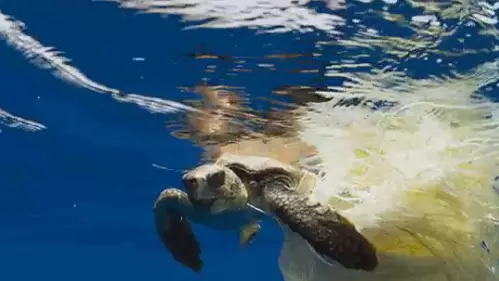
People go through a rollercoaster of emotions every Sunday when Sir David Attenborough takes them on a journey to our oceans. While many are wowed, excited and shocked at what's lurking beneath the surface of the big blue, many were devastated when a segment of Blue Planet II focused on plastic.
While some people are aware of the statistics of plastic pollution, such as eight million tonnes of it ending up in our oceans every year, it was the images of wildlife being affected that hit home the most.
The most heart-breaking moment was watching a pilot whale carry her dead new-born calf in her mouth. Sir David said it was very likely that it was her milk, contaminated by plastic, that killed the baby, and yet the mother couldn't seem to let the new arrival go.
The legendary presenter told viewers: "Today in the Atlantic waters they have to share the ocean with plastic. A mother is holding her new-born young - it's dead.
"Unless the flow of plastics and industrial pollution into the ocean is reduced, marine life will be poisoned by them for many centuries to come.
"The creatures that live in the big blue are perhaps more remote than any other animal but not remote enough to escape the effects of what we are doing to their world."
The distressing scenes sparked a flurry of messages on social media from people wanting to change their habits.
The episode also showed smaller animals like turtles becoming trapped in floating debris. It even gets to the bottom of the food chain when plastic breaks down into micro particles.
While teams working on nature documentaries rarely intervene in the settings they feature, the BBC team ensured they cleaned up every bit of pollution they came across. Assistant producer Sarah Conner told the BBC's Newsbeat: "There would rarely be a dive where I wouldn't find some form of plastic from a thread of plastic fishing line, sweet wrappers or plastic bottles.
"When in the open ocean on the boat, if we noticed rubbish while in transit we would do our best to stop and pick it up, just as anyone who cares for the ocean would hopefully do.
"Microplastics are now so pervasive in the ocean and are consumed by a vast number of sea creatures.
"They have even been found in samples from the Mariana Trench, the deepest part of our planet."
Sir David hopes Blue Planet II will encourage viewers to heed his message and cut down on their plastic use.
LADbible has claimed the world's first country made entirely of trash to highlight the issue of plastic pollution in our oceans.
Advert
Get involved and ensure the world's first country made of trash is its last.
Become a citizen of the Trash Isles here
Donate to our charity partner, Plastic Oceans Foundation here
Topics: World News, Entertainment, TV and Film, Blue Planet, Sir David Attenborough, Documentary, Animals, Nature